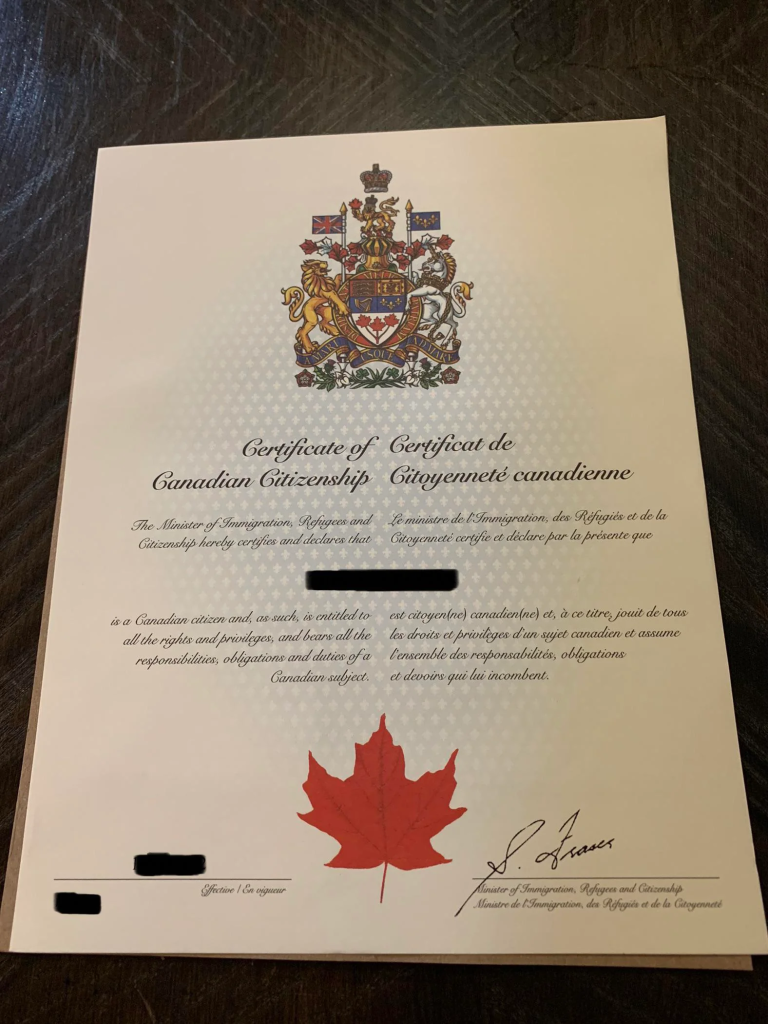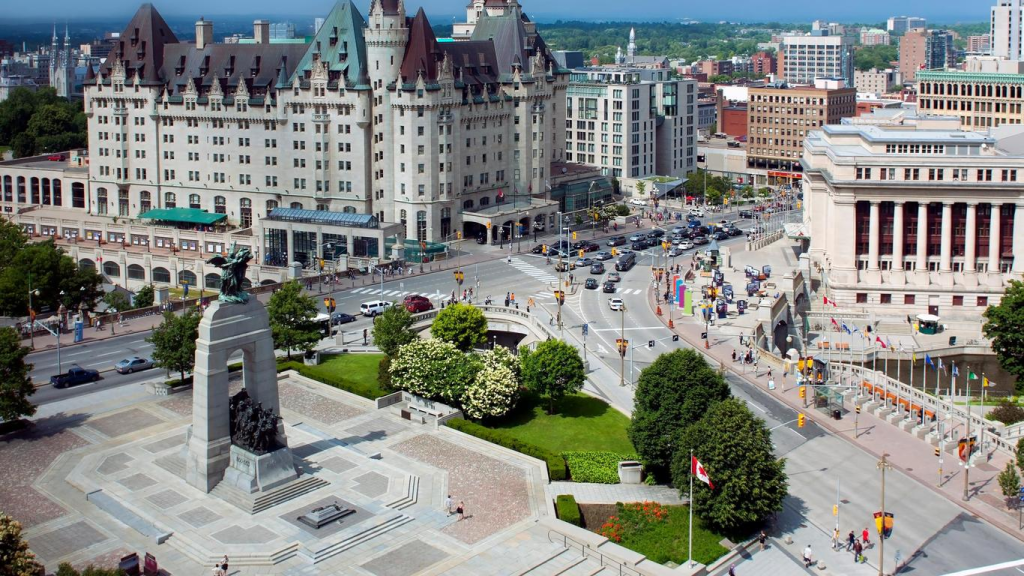Canada, known for its diverse culture, stunning landscapes, and welcoming people, has a reputation for being a nation that embraces inclusivity and immigration.
Canada, the land of maple leaves, hockey, and a multicultural mosaic, has a unique approach to citizenship that revolves around the concept of birthright.
But what about those fortunate enough to be born within its borders? Does being born in Canada automatically grant you citizenship?
Let’s delve into this intriguing question and provide the answers you need.
Child Born in Canada While Parents on Work Permit | Canadian Citizenship Status

Birthright Citizenship: A Canadian Tradition
The principle of “jus soli,” or birthright citizenship, is deeply ingrained in Canada’s legal system.
This means that if you’re born on Canadian soil, you are generally considered a Canadian citizen, regardless of your parents’ nationality.
This inclusive policy reflects the nation’s commitment to acknowledging and valuing the contributions of everyone who calls Canada home.
Exceptions To The Rule
As with most rules, there are exceptions to birthright citizenship in Canada.
The most notable exception applies to children born to foreign diplomats or consular officials.
Such individuals and their families are not subject to Canadian jurisdiction; therefore, their children do not receive Canadian citizenship based solely on their place of birth.
This exception is rooted in the concept of diplomatic immunity, acknowledging that those individuals are subject to the jurisdiction of their home country rather than Canada.
Dual Citizenship And Beyond
Canada recognizes the concept of dual citizenship, which means that even if you’re born in Canada to foreign parents, you may be eligible for both Canadian citizenship and the citizenship of your parents’ country.
This dual citizenship arrangement can open up international travel, education, and work opportunities.
Permanent Residency vs. Citizenship

While being born in Canada grants you the possibility of Canadian citizenship, it’s important to note that there’s a distinction between being a citizen and being a permanent resident.
Permanent residents have the right to live and work in Canada.
Still, they must fulfill certain requirements before becoming citizens, such as living in Canada for a certain number of years, demonstrating language proficiency, and passing a citizenship test.
Canadian Values And Identity
Canada’s commitment to birthright citizenship reflects its inclusivity, diversity, and equality values.
It sends a strong message that being Canadian is not determined solely by one’s background or heritage but by shared values and a sense of belonging.
By automatically bestowing citizenship on those born within its borders, Canada celebrates the richness of cultures, languages, and traditions that define its unique identity.
Also see: Canadian Citizenship Requirements Update
8 Rights and Privileges of a Child Born in Canada
Canada, with its commitment to human rights, equality, and inclusivity, extends a warm embrace to children born on its soil.
These young individuals have a wealth of rights and privileges that reflect the nation’s values and dedication to fostering a better future for all.
Let’s delve into the myriad opportunities that await a child fortunate enough to be born in the Great White North.
1. Birthright Citizenship: A Foundation of Possibilities
First and foremost, being born in Canada grants an individual automatic Canadian citizenship, thanks to the principle of “jus soli.”
This citizenship symbolizes a sense of belonging and opens doors to many opportunities, shaping the child’s life trajectory from the beginning.
They are also eligible to be appointed to the Senate, stand for, and vote during elections, and they are also entitled to a Canadian passport.
2. Education: The Gateway to Knowledge
One of the most significant privileges a child born in Canada enjoys is access to a world-class education system.
From early childhood education to post-secondary studies, Canada provides a nurturing environment that empowers children to develop skills, pursue their passions, and become informed, critical thinkers.
3. Healthcare: A Fundamental Right
Canada’s universal healthcare system ensures that every child, regardless of their background, has access to medical care, ensuring a healthy start in life.
This essential privilege safeguards their well-being, allowing them to grow, learn, and explore without the burden of health-related concerns.
4. Freedom of Expression and Identity
Children born in Canada benefit from the nation’s strong commitment to freedom of expression.
They can voice their thoughts, ideas, and opinions, contributing to vibrant discussions and shaping the country’s evolving narrative.
Additionally, they can explore their identity, culture, and beliefs without fear of discrimination.
5. Social Services and Protection
Canada’s social safety net extends to children, providing them with social services that ensure a stable and nurturing environment.
This safety net includes child protection services, ensuring their rights are safeguarded, and their well-being is a priority.
7. Equal Opportunities and Inclusivity
Canada’s dedication to equality means that children born within its borders are offered equal opportunities to thrive, regardless of their background or circumstances.
This commitment extends to combating discrimination, enabling every child to chase their dreams without barriers.
8. Building Global Citizens
Growing up in Canada equips children with a unique perspective on global issues and diverse cultures.
The multicultural environment allows them to learn about and appreciate different ways of life, fostering empathy and understanding that are vital in a globally interconnected world.
Nurturing Potential, Building a Bright Future
In Canada, the rights and privileges bestowed upon children born within its borders are not just legal provisions; they reflect the nation’s core values.
The opportunities for education, healthcare, expression, and protection are the building blocks that enable these children to grow into responsible, informed, and compassionate individuals who contribute positively to their communities and the world at large.
The story of a child born in Canada is not just one of citizenship but of empowerment, equal opportunities, and the boundless potential that comes with being part of a nation that believes in a better tomorrow for all.
5 Ways To Check Your Canadian Citizenship Status

Canadian citizenship is a privilege that bestows numerous rights and opportunities.
Whether you’re exploring your own citizenship status or need to prove your Canadian identity, understanding the process is crucial.
Here’s a comprehensive guide on how to check or prove your Canadian citizenship.
1. Birthright: If you were born in Canada, you are likely a Canadian citizen by birthright.
The principle of “jus soli” grants citizenship to those born on Canadian soil.
2. Naturalization: If you immigrated to Canada and fulfilled the necessary residency requirements, you may have obtained citizenship through the naturalization process.
3. Birth Certificate: A Canadian birth certificate is solid proof of citizenship if you were born in Canada.
4. Citizenship Certificate: If you’re a naturalized citizen, you received a certificate as proof of your citizenship during the naturalization process.
5. Government Websites: The official website of Immigration, Refugees, and Citizenship Canada (IRCC) provides information on how to check your citizenship status.
You can also use their online tool to verify your citizenship status using personal information.
6. Call or Visit: If you need further assistance or information, contact the IRCC helpline or visit a local IRCC office.
7. Consult an Expert: If you’re unsure about your citizenship status or need legal guidance, consulting an immigration lawyer or professional can be helpful.
4 Ways To Prove Your Canadian Citizenship
1. Citizenship Certificate: If you’re a naturalized citizen, your citizenship certificate is the primary document proving your Canadian citizenship.
Keep it safe and accessible.
2. Travel Documents: Canadian citizens need a Canadian passport for international travel.
A valid Canadian passport is strong proof of citizenship.
3. ID Cards: Canadian driver’s licenses, health cards, and other government-issued identification documents can also be used to establish your Canadian identity.
4. Employment and Tax Documents: Citizenship may be verified through employment and tax records and other official correspondence from government agencies.
Canadian Citizenship | 3 Things to Keep in Mind
1. Keep Documents Secure: Store your citizenship documents safely to prevent loss or damage.
2. Be Prepared: When traveling or accessing services, always carry an appropriate identification document, such as a passport or a citizenship card.
3. Stay Updated: Citizenship laws and requirements may change. Keep yourself informed through official government sources.
Verifying or proving Canadian citizenship involves a combination of documentation, online tools, and potential consultation with experts.
Whether you’re a citizen by birthright or through naturalization, understanding the process and having the right documents on hand ensures that you can fully enjoy the rights and privileges of being a Canadian citizen.
How Much Does Childbirth Cost in Canada?

Canada’s reputation as a welcoming and diverse nation often raises questions about the costs of giving birth to foreigners.
The prospect of receiving quality healthcare services in a new country is intriguing.
Still, it’s essential to understand the financial implications for non-residents who choose to give birth in Canada.
Let’s delve into the unique considerations and costs involved.
Also see: Canadian Passport Application Form Online
Healthcare Services For Foreigners
If you’re a visitor or non-resident, childbirth can be very expensive in Canada because you won’t have access to the Medicare program.
However, you could cover the costs with private international health insurance.
Otherwise, you would have to pay out-of-pocket. Regular birth for tourists and non-residents ranges from C$5000 to C$8000, while a C-section birth ranges from C$10,000 to C$12,000
Canada’s healthcare system primarily serves Canadian citizens and permanent residents.
However, foreigners who give birth in Canada may access emergency medical care and services required to ensure the safety and well-being of both the mother and the child.
Cost Considerations
1. Emergency Medical Care: Foreigners giving birth in Canada receive emergency medical care as needed.
This includes medical attention required during labor and delivery to ensure safe and healthy childbirth.
2. Out-of-Pocket Expenses: Foreigners typically do not cover routine prenatal care, labor, and delivery expenses.
These costs may include medical consultations, hospital stays, and medical procedures.
3. Private Health Insurance: Many foreigners purchase private health insurance to cover healthcare costs during their stay, including childbirth.
It’s crucial to review any insurance plan’s coverage terms and limitations carefully.
4. Hospital Policies: Hospitals in Canada have policies regarding payment for healthcare services provided to non-residents.
Understanding these policies in advance can help you plan effectively.
Cost of Childbirth in Canada | 6 Factors to Keep in Mind
1. Location: Healthcare costs can vary by province.
It’s important to research the specific costs and regulations in the province where you plan to give birth.
2. Healthcare Provider: Different healthcare providers may offer varying services and pricing options.
Researching different options can help you make informed decisions.
3. Emergency Situations: Healthcare providers prioritize the patient’s well-being in emergencies.
Immediate care is provided without considering immigration status.
4. Research and Inquiries: Reach out to healthcare providers, hospitals, and insurance companies well in advance to understand costs, requirements, and options.
5. Budgeting: Anticipate potential healthcare expenses by setting aside funds for prenatal care, delivery, and unforeseen medical costs.
6. Health Insurance: If you choose private health insurance, carefully review coverage details related to childbirth-related services.
A Balanced Approach to Childbirth in Canada
The decision to give birth in Canada as a foreigner involves weighing the benefits of accessing quality healthcare services against the associated costs.
While Canada’s healthcare system offers emergency care, foreigners should be prepared for potential out-of-pocket expenses for routine childbirth services.
Thorough research, exploration of insurance options, and careful planning are key to making informed choices that prioritize the well-being of both mother and child while ensuring a positive childbirth experience in a new and diverse environment.
9 Ways How To Sponsor Your Parents to Canada
Reuniting with loved ones is a cherished goal for many.
Canada’s family sponsorship program provides a pathway for bringing parents to join their children in this diverse and welcoming nation.
Navigating sponsoring parents to Canada requires careful attention to detail and adherence to specific procedures.
Here’s a comprehensive guide to help you embark on this meaningful journey.
1. Eligibility Requirements
Before initiating the sponsorship process, ensure you meet the following criteria:
- Be a Canadian citizen, permanent resident, or registered Indian under the Canadian Indian Act.
- Be at least 18 years old.
- Demonstrate that you have sufficient income to support your parents financially during their initial period in Canada.
2. Gather the Required Documents
Collect all the necessary documents, which may include:
- Proof of your status as a Canadian citizen or permanent resident.
- Birth certificates to establish the parent-child relationship.
- Marriage certificates and divorce decrees, if applicable.
- Proof of financial ability to support your parents.
3. Submit an Interest to Sponsor Form
When Immigration, Refugees, and Citizenship Canada (IRCC) opens the annual application cycle for parent and grandparent sponsorships, you must submit an Interest to Sponsor form online.
This form expresses your intent to sponsor your parents and puts you in a lottery selection process.
4. Invitation to Apply
You will receive an Invitation to Apply (ITA) for the parent sponsorship program if selected in the lottery.
This ITA will contain detailed instructions on proceeding with the sponsorship application.
5. Complete the Application
- Fill out the sponsorship application forms provided by IRCC accurately and completely.
- Pay the required processing fee and submit the application, along with the necessary supporting documents.
6. Processing Time
The processing time for parent sponsorships can vary, so monitoring your application’s status through your IRCC account is important.
7. Medical Examination and Police Clearance
Your parents will need to undergo medical examinations and obtain police clearance certificates from each country they have lived in for six months or more since turning 18.
8. Super Visa Option
While parent sponsorship is a more permanent option, the Super Visa allows parents and grandparents to visit Canada for up to two years at a time, without the need for renewal, for a duration of up to 10 years.
9. Arrival in Canada
Once your parents receive their permanent resident visas, they can make arrangements to move to Canada.
It’s important to ensure they have the required documents and know their rights and responsibilities as newcomers.
Sponsoring parents in Canada involves well-defined steps requiring careful preparation, patience, and attention to detail.
The process, though thorough, provides an opportunity for families to be reunited and to build new memories in the context of a vibrant and diverse Canadian society.
Whether through the traditional sponsorship route or the Super Visa program, the path to bringing your parents to Canada is a meaningful and rewarding journey of love and reunification.
Also see: How To Apply For SIN Online In Canada
Give Your Child The Privileges Canadian Citizenship Offers
If you are born in Canada, you are automatically a citizen, inheriting the gift of Canadian nationality through the principle of birthright citizenship, except for certain exceptions stated in this post.
This principle showcases Canada’s dedication to inclusivity, its open-hearted embrace of diversity, and its firm belief in the potential of every individual to contribute to the nation’s ongoing story.
The question of citizenship transcends legal definitions; it embodies the very essence of what it means to be Canadian—a tapestry woven from countless threads of origin and experience, united under the banner of shared values and a collective vision for a better future.
Give your child a chance to enjoy the privileges Canadian citizenship affords. You have that responsibility.

